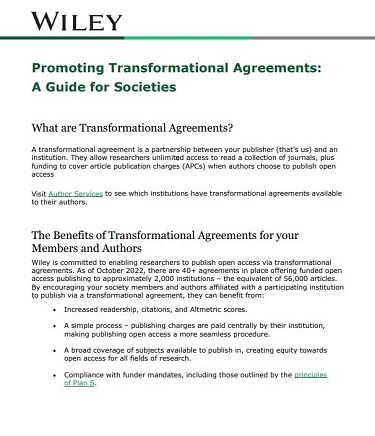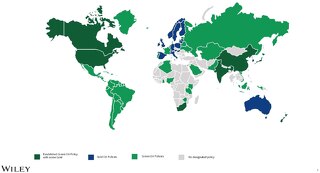knowledge-is-for-everyone-what-does-it-take-to-foster-diversity-equity-and-inclusion-in-publishing
June 13, 2022
We all have a part to play in the mission to become more diverse, inclusive and equitable – we’re working on it, but we want to get it right. And sharing learning and experience is key to making progress. In our recent Society Executive Seminar, Kim Eggleton (IOP Publishing) and Michael Willis (Wiley) shared practical actions and learnings so far:
Where do we come into this, as publishers and societies? And why should we do something about it?
Research publishing impacts career development
The more a researcher publishes, the more likely they are to be successful in their career; publishing high-impact research brings improved chances of obtaining funding, promotion and awards. Due to these systems of reward, we have a responsibility within publishing to ensure we are not disadvantaging certain groups and hence impacting their career development.
This means building editorial boards that are truly representative of our diverse communities and ensuring editorial decision-making is not biased.
Research is more impactful when it’s inclusive
Studies have found that articles with ethnically diverse co-authors gain more attention and citations. Other studies show that, the greater the diversity of authors, the greater the innovation of their research.
It's not just about who we're publishing but what
Who are the participants in a research study? Do they reflect the diversity of our community? Bias in research can have serious impacts on our society – from public health, where pharmaceutical products don’t account for differences due to gender, to everyday technology, where race and gender affect the accuracy of tools like speech recognition.
As publishers of this research, we have the ability to make a real difference, by embedding practices that ensure the research we publish is tested across a broad range of people.
Taking action: data and beyond
In order to embody real change, we need to embrace inclusive practices both internally and externally as organizations. This means changing the way we publish research, but also how we empower internal colleagues to engage with diversity, equity and inclusion. Here are some of the ways we can take action:
1. Data - data can help us to understand the complexities of the problem and measure the impact of potential solutions. But there are some considerations to bear in mind, to ensure the data is both accurate, as well as gathered and used in a sensitive, ethical way. These include legal issues (how to treat sensitive data and comply with data regulations etc) and moral issues (making questions optional and allowing self-descriptors). AI tools tend to be less accurate, which leads to misleading data that inaccurately predicts diversity.
2. Focus groups – open and supportive groups, where participants can discuss why they make certain choices in publishing. Conversations can be uncomfortable, but they help us to understand the ‘why’, so we can better tackle unconscious bias.
3. Myth-busting, supported by data – once you understand more about the preconceptions and thoughts governing certain choices, you can use myth-busting to tackle it.
4. Training – training colleagues, as well as editors and peer reviewers, to make conscientious, unbiased decisions. It’s also important for training colleagues to have courageous conversations around DE&I.
5. Updating policies and implementing technological changes – adapting our platforms, so they better support our diverse community of authors. Changes have included flagging reviewers from under-represented groups in the reviewer database, enabling authors to publish their pronouns and updating our author name change policy.
6. Surveys – learning what’s working and what isn’t, by asking authors and reviewers about their experience. The society member survey also provides insights into members views on societies and DE&I.
7. Updating policies and signing commitments – you may have heard of the UN Sustainable Development Goals (SDGs). As part of this, Wiley has signed up to the UN SDGs publishers compact, which aims to achieve these goals in publishing by 2030. We have also signed up to DORA (Declaration On Research Assessment), which involves supporting equitable systems of reward for authors. IOP Publishing is trialling the SAGER guidelines, which provide a framework for sex and gender reporting in research.
8. Talent acquisition - using AI powered support to diversify the candidate recruitment pool, establishing scholarship schemes (Wiley has worked with PeduL on this) and providing training to ensure a fair interview process.
9. Building community support - Employee resource groups (e.g. black employee resource groups, PRIDE and Latino groups, among others) build support for diverse community groups within an organisation and create space to engage in conversation and educate others.
10. Embedding DE&I within organizations - Appoint colleagues that work specifically on the DEI agenda and strategy and establish DE&I workstreams across all parts of the organizations – from communications, to legal, to editorial. Our workstreams include business leads, advisory boards and working groups.
What have we learned?
Some of the key takeaways we’ve found so far include:
- Constant evolution, questioning, refining
- Tackling DE&I is complex
- Think holistically
- It's everyone’s issue
- Avoid focusing on one identity group to the neglect of others
- Avoid tokenism, counting numbers, and virtue signaling
- Don’t let the perfect be the enemy of the good – get started!
We’re in this together
By combining our resources and working together, we can have a greater impact. The Coalition for Diversity and Inclusion in Scholarly Communications (C4DISC) has established a set of underlying principles, with a range of tools and guidance we can all use to navigate issues of DE&I.
The Royal Society of Chemistry has also created The Joint Commitment, whereby organizations in publishing commit to action on equity, diversity and inclusion. This includes adhering to minimum standards and standardizing questions for self-reported diversity data collection. The four pledges are a helpful foundation on which to develop a strategy and focus resources in your organization.
As your publishing partners, we can work with you to build DE&I into our publishing strategy – reach out to your Wiley contact to discuss this further.










